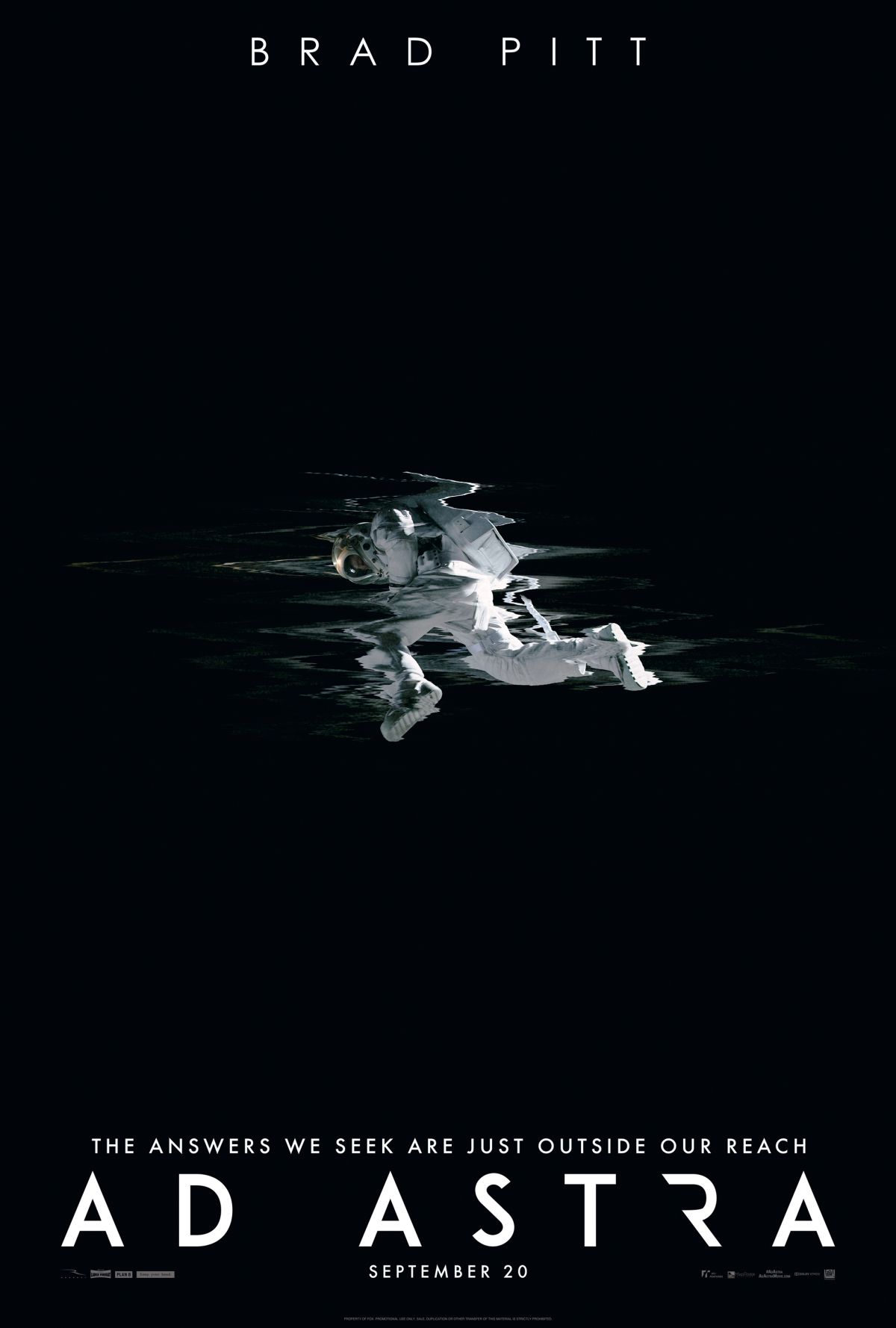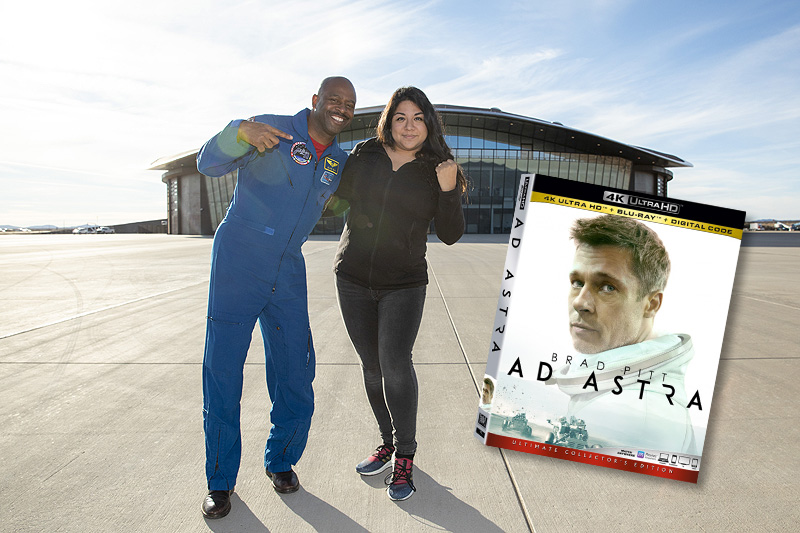Recently we sent one of our ComingSoon.net correspondents to a real-life space exploration experience to train like Brad Pitt did for his latest film Ad Astra. Check out our interviews and video experiences below, and check out the film on Digital, 4K, Blu-ray and DVD right now!
Click here to purchase Ad Astra on Blu-ray!
Our favorite part of the experience was taking a spin in a G-Force simulator, where we found out if we had what it takes to make it through one of the vital components of basic training to withstand the elements of shuttling through space…
RELATED: Ad Astra Featurette Celebrates the Moon Landing Golden Anniversary
In Truth and Consequences New Mexico, Spaceport America promises to be the first-ever port of launch for commercial space travel. We got to visit to celebrate the release of Ad Astra, which takes place in a future where humankind explores the far reaches of space. While we are in the early stages of the reaches the film goes to, we were able to see a panel with real-life astronauts where they shared how commercial travelers would be operating like real teams on a mission through space. Something that films like Ad Astra –though fictional– explores in how relationships, human psychology, and innovations need to go hand in hand for our civilization to succeed in space travel.
Guests included the film’s Technical Consultant and former NASA Engineer Robert Yowell, Astronaut Ellen Ochoa (the first Hispanic female astronaut to travel to space) and Astronaut Leland Melvin (the only NFL draftee who has also traveled to space). The conversation was moderated by STEM personality Justin Shaifer.
Justin Shaifer: What do you think about Ad Astra and how it showcased space and the history of space exploration?
Robert Yowell: Certainly, it’s a continuum of Science Fiction films that we have here culminating in Ad Astra and go back to 2001: A Space Odyssey for instance at it’s time in the late 60’s it sort of was state of the art in visual effects; etc. But we have the great luxury today with tremendous CGI and technologies with I think all the more brought out some of the better parts of Ad Astra that was never possible until today.
Justin Shaifer: One of the more interesting parts about Ad Astra was the unfortunate journey that Brad Pitt’s character takes to Neptune, alone. The emotions are depicted during his arduous journey and in a way it’s solitary confinement. How accurate is that depiction and to be in those small spaces as an astronaut?
Astronaut Ellen Ochoa: Well clearly for the whole dramatic arc of the film that is a very psychological drama and I think that added to it, and it echoes things throughout his character including his relationship with his father. I think we had very different experiences in space, but if you were gonna be in space for a long period of time and you’re going to be in a space that is not very big it is really important to think about behavioral health. And NASA does spend a lot of time on it. I remember one of our astronauts went on a Russian space mission here and they came back saying the most important thing is that you need to stay busy with meaningful work. So it wasn’t a situation of doing an inventory of the space station, because I know that’s just busywork. When there’s opportunity to be doing some kind of science or engineering research as part of your journey, I think that would be very beneficial to astronauts. And then, how do you best stay in communication? As you get further and further away from Earth that becomes a bigger and bigger problem because of the delays. You can’t just have a conversation like the people on space stations do today. They can call any phone number on Earth and have a conversation and that keeps them in touch. So you really have to think about how you are going to stay connected to humanity and that is something we have to think a lot about.
Justin Shaifer: What’s the most exciting thing to you right now about the future?
Astronaut Leland Melvin: I think one of the most exciting things right now is that you have a panel like thing about the discussion of space travel. You have a Hispanic female astronaut and an African-American male astronaut on the panel and that has historically been very rare and when the kids out there see this we will think I can do that. So the representation that’s been happening in the movies and in real life for space travel and research, it’s helping everyone feel like they have a seat at the table that’s part of this journey with everyone else.
Astronaut Ellen Ochoa: And this is an incredibly exciting time in human space flight. I’ll just say that 2020 is going to be a great year. Both companies that NASA has contracted with has agreed to take NASA Astronauts to and from the National Space Station, Boeing and Space X, are planning to start those flights in 2020 and at their release, I’m sure we’ll see their test flights. There’s a lot of things that people have been talking about for a while now, that’s finally coming together and we’ll see them in 2020, so it’s really exciting.
Question: What values do you think should be added to humanity from what you’ve learned thought space travel and also the movie Ad Astra?
Astronaut Ellen Ochoa: The values that NASA has included a really big one in teamwork. The collaboration and cooperation that goes on whether its up on the crew of various international space agencies or between government and commercial agencies, teamwork is essential and this is a field where that makes all the difference. So that’s one that I’d certainly point to.
Question: In your opinion, why are space films like Ad Astra important to see?
Robert Yowell: I think movies like this give us hope for the future. The show us what’s possible in the future and they help open your mind to what’s possible. In the film, 2001: A Space Odysee, there’s a scene where the two astronauts are watching the news on an iPad, that’s exactly what it is and I’m sure Steve Jobs watched that movie as a kid. It takes movies to inspire, just like books and other media, but movies are a permanent record so the nice thing is that future generations will go back and see, “well this is what they thought 2100 was going to look like.” So that’s why I think it’s important.
Dan Hicks: As humans, it helps our imaginary spirit to have these movies and these books. It helps our imagination go. We see movies like Ad Astra and we start asking, how did they do that or I wonder what it would be like to do this and I think it’s important that we continue to do these because what I believe firmly as humans, is that if we can envision something we can imagine something in our minds, I think then as scientists and engineers figure out a way to make it happen. But it starts with people that are talented like a producer with this movie and a writer that presents these ideas in novels that get our imagination going.
We also got to experience a real-life rover ride, as Brad Pitt did in an action sequence in Ad Astra, on the chilly desert terrain that is similar to Mars…
AD ASTRA is out on Digital, 4K, Blu-ray and DVD right now!
Ad Astra
-
Ad Astra

-
Ad Astra











